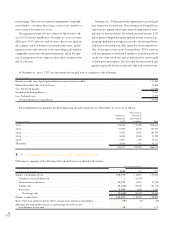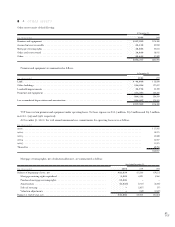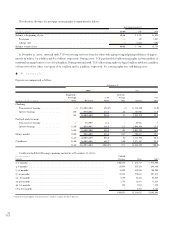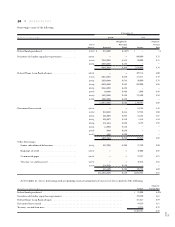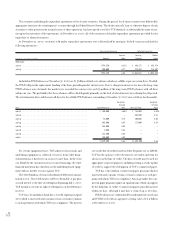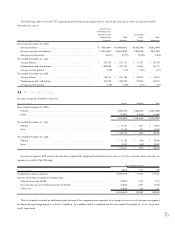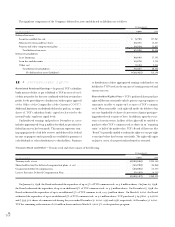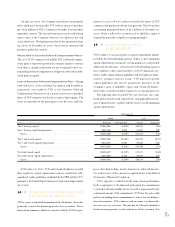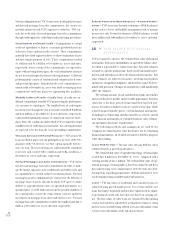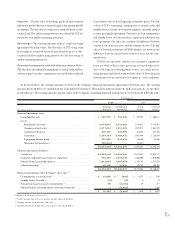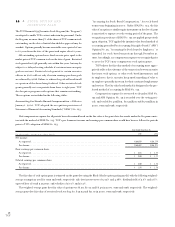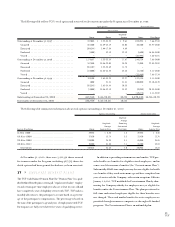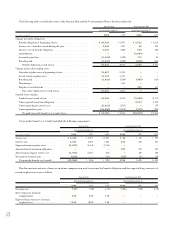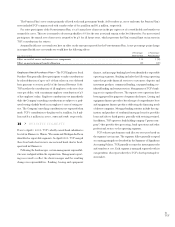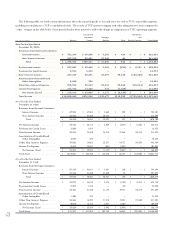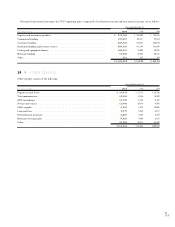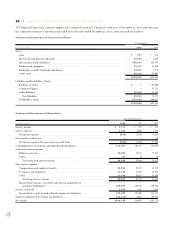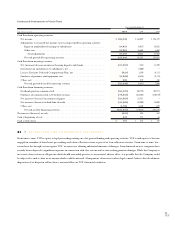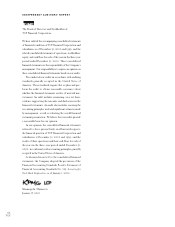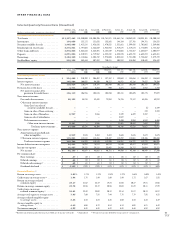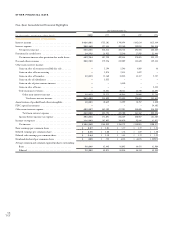TCF Bank 2000 Annual Report Download - page 60
Download and view the complete annual report
Please find page 60 of the 2000 TCF Bank annual report below. You can navigate through the pages in the report by either clicking on the pages listed below, or by using the keyword search tool below to find specific information within the annual report.
16 >STOCK OPTION AND
INCENTIVE PLAN
The TCF Financial 1995 Incentive Stock Program (the “Program”)
was adopted to enable TCF to attract and retain key personnel. Under
the Program, no more than 5% of the shares of TCF common stock
outstanding on the date of initial shareholder approval may be
awarded. Options generally become exercisable over a period of one
to 10 years from the date of the grant and expire after 10 years.
All outstanding options have a fixed exercise price equal to the
market price of TCF common stock on the date of grant. Restricted
stock granted in 1998 generally vests within five years, but may be
subject to a delayed vesting schedule if certain return on equity
goals are not met. Restricted stock granted to certain executive
officers in 2000 will vest only if certain earnings per share goals
are achieved by 2008. Failure to achieve the goals will result in all
or a portion of the shares being forfeited. Other restricted stock
grants generally vest over periods from three to eight years. TCF
also has prior programs with options that remain outstanding.
Those options are included in the following tables.
Accounting for Stock-Based Compensation – Effective
January 1, 2000, TCF adopted the recognition provisions of
Statement of Financial Accounting Standards (“SFAS”) No. 123,
“Accounting for Stock-Based Compensation,” for stock-based
transactions beginning in 2000. Under SFAS No. 123, the fair
value of an option or similar equity instrument on the date of grant
is amortized to expense over the vesting period of the grant. The
recognition provisions of SFAS No. 123 are applied prospectively
upon adoption. TCF applied the intrinsic value based method of
accounting prescribed by Accounting Principles Board (“APB”)
Opinion No. 25, “Accounting for Stock Issued to Employees,” as
amended, for stock-based transactions through December 31,
1999. Accordingly, no compensation expense was recognized prior
to 2000 for TCF’s non-compensatory stock option grants.
TCF believes the fair value method of accounting more appro-
priately reflects the substance of the transaction between an entity
that issues stock options, or other stock-based instruments, and
its employees; that is, an entity has granted something of value to
an employee generally in return for their continued employment
and services. The fair value based method is designated as the pre-
ferred method of accounting by SFAS No. 123.
Compensation expense for restricted stock under SFAS No.
123 and APB Opinion No. 25 is recorded over the vesting peri-
ods, and totaled $9.4 million, $9.5 million and $5.9 million in
2000, 1999 and 1998, respectively.
Had compensation expense for all periods been determined based on the fair value at the grant dates for awards under the Program consis-
tent with the method of SFAS No. 123, TCF’s pro forma net income and earnings per common share would have been as follows for periods
prior to TCF’s adoption of SFAS No. 123:
Year Ended December 31,
(In thousands, except per-share data) 1999 1998
Net income:
As reported . . . . . . . . . . . . . . . . . . . . . . . . . . . . . . . . . . . . . . . . . . . . . . . . . . . . . . . . . . . . . . . . . $166,039 $156,179
Pro forma . . . . . . . . . . . . . . . . . . . . . . . . . . . . . . . . . . . . . . . . . . . . . . . . . . . . . . . . . . . . . . . . . . $164,607 $156,271
Basic earnings per common share:
As reported . . . . . . . . . . . . . . . . . . . . . . . . . . . . . . . . . . . . . . . . . . . . . . . . . . . . . . . . . . . . . . . . . $ 2.01 $ 1.77
Pro forma . . . . . . . . . . . . . . . . . . . . . . . . . . . . . . . . . . . . . . . . . . . . . . . . . . . . . . . . . . . . . . . . . . $ 2.00 $ 1.77
Diluted earnings per common share:
As reported . . . . . . . . . . . . . . . . . . . . . . . . . . . . . . . . . . . . . . . . . . . . . . . . . . . . . . . . . . . . . . . . . $ 2.00 $ 1.76
Pro forma . . . . . . . . . . . . . . . . . . . . . . . . . . . . . . . . . . . . . . . . . . . . . . . . . . . . . . . . . . . . . . . . . . $ 1.98 $ 1.76
The fair value of each option grant is estimated on the grant date using the Black-Scholes option pricing model, with the following weighted-
average assumptions used for 1999 and 1998, respectively: risk-free interest rates of 5.03% and 4.78%; dividend yield of 2.7% and 2.6%;
expected lives of 7 and 5.25 years; and volatility of 27.0% and 27.2%.
The weighted-average grant date fair value of options was $6.59, $7.02 and $6.49 in 2000, 1999 and 1998, respectively. The weighted-
average grant date fair value of restricted stock was $24.60, $25.94 and $31.19 in 2000, 1999 and 1998, respectively.
58
TCF


